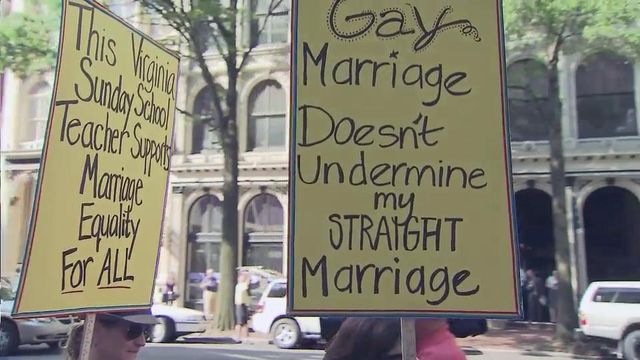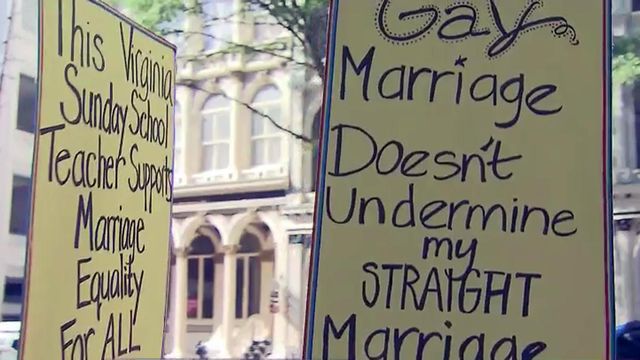NC to stop defending marriage amendment
Following a federal appeals court ruling Monday that Virginia's same-sex marriage ban is unconstitutional, North Carolina Attorney General Roy Cooper said his office would no longer oppose challenges to the state's constitutional amendment outlawing same-sex marriage.
Posted — UpdatedA three-judge panel of the 4th U.S. Circuit Court of Appeals in Richmond, Va., ruled that Virginia's constitutional and statutory provisions barring gay marriage and denying recognition of such unions performed in other states violate the U.S. Constitution. The Virginia gay marriage case is the latest in a string of decisions overturning bans across the country and is one of several that could go to the U.S. Supreme Court.
Because North Carolina is part of the 4th Circuit, the decision likely mean's the state's 2012 constitutional amendment defining marriage as between one man and one woman will also be overturned in the courts, Cooper said.
"It's time to stop making arguments we will lose and instead move forward, knowing that the ultimate resolution will likely come from the United States Supreme Court," he said.
The Attorney General's Office has "vigorously defended" North Carolina's law, he said, adding that they have "made about every legal argument imaginable" to fend off lawsuits challenging its legality. Given Monday's ruling, however, he said North Carolina would acknowledge the court's opinion that marriage is a fundamental right.
"All federal courts have rejected these arguments each and every time, so it's time for the state of North Carolina to stop making them," he said. "There's really no argument left to be made."
Cooper has spoken out previously against North Carolina's amendment, but he said the decision Monday not to continue fighting to uphold it was based solely on the legal merits of the case and was separate from his personal opinion.
Still, Senate President Pro Tem Phil Berger wasn't pleased with Cooper's decision.
"North Carolinians overwhelmingly voted to put the marriage amendment into our state constitution and expect their attorney general to uphold his oath of office by defending that constitution,” Berger, R-Rockingham, said in a statement.
Lawmakers passed legislation last year that gives Berger and House Speaker Thom Tillis the authority to intervene and hire lawyers to defend state laws whenever the Attorney General's Office declines to do so.
Virginia law can't trump 'fundamental right'
In 2006, Virginians voted 57 percent to 43 percent to approve the constitutional amendment banning gay marriage. Virginia laws also prohibit recognition of same-sex marriages performed in other states.
Virginia's same-sex marriage bans "impermissibly infringe on its citizens' fundamental right to marry," Judge Henry F. Floyd wrote in the court's opinion.
"Americans’ ability to speak with their votes is essential to our democracy. But the people’s will is not an independent compelling interest that warrants depriving same-sex couples of their fundamental right to marry," Floyd wrote.
In February, U.S. District Judge Arenda Wright Allen ruled that Virginia's same-sex marriage ban violates the U.S. Constitution's equal protection and due process guarantees. Lawyers for two circuit court clerks whose duties include issuing marriage licenses appealed. Attorney General Mark Herring, representing a state official also named as a defendant, sided with the plaintiffs.
"Marriage is one of the most fundamental rights — if not the most fundamental right — of all Americans," David Boies, an attorney for the plaintiffs, said in a statement. "This court has affirmed that our plaintiffs — and all gay and lesbian Virginians — no longer have to live as second-class citizens who are harmed and demeaned every day."
The Virginia lawsuit was filed by Timothy Bostic and Tony London of Norfolk, who were denied a marriage license, and Carol Schall and Mary Townley of Chesterfield County. The women were married in California and wanted their marriage recognized in Virginia, where they are raising a 16-year-old daughter.
Two other same-sex couples, Joanne Harris and Jessica Duff of Staunton and Christy Berghoff and Victoria Kidd of Winchester, filed a similar lawsuit in Harrisonburg and were allowed to intervene in the case before the appeals court.
It was not immediately clear if or when Virginia would need to begin issuing marriage licenses to same-sex couples.
Ruling latest in string of decisions favoring gay marriage
Gay marriage proponents have won more than 20 legal decisions around the country since the U.S. Supreme Court last year struck down a key part of the federal Defense of Marriage Act. Those rulings remain in various stages of appeal.
More than 70 cases have been filed in all 31 states that prohibit same-sex marriage. Nineteen states and the District of Columbia allow such marriages.
Gay rights advocates in North Carolina hailed the ruling.
"Today’s ruling is further proof that there is not a single valid legal argument to uphold Amendment One. It's not a question of if Amendment One will be struck down, but when," Rev. Jasmine Beach-Ferrara, executive director of Campaign for Southern Equality, said in a statement. "Each day that North Carolina’s ban on same-sex marriage remains on the books, families are harmed."
Six North Carolina families and several clergy across the state have filed lawsuits to overturn North Carolina's gay marriage ban.
"Today’s ruling sets a clear precedent for courts in North Carolina and is the most significant step to date toward securing the freedom to marry for all loving and committed couples in our state,” Chris Brook, legal director for the ACLU of North Carolina Legal Foundation, which also has challenged the North Carolina amendment, said in a statement.
One of those families, Marcie and Chantelle Fisher-Borne, believes things are headed in the right direction for North Carolina.
The couple, who were wed in Washington, D.C. where same sex marriages are legal, have been together for 17 years and have two children together. They're also seeking second parent adoption rights.
"We're are excited about where things are moving," Marcie Fisher-Borne said. "I think it's the right decision and we're excited for North Carolina."
Attorneys and plaintiffs in two of the lawsuits filed to challenge the state's law will speak at a news conference in downtown Raleigh at noon Tuesday.
Tami Fitzgerald, executive director of the North Carolina Values Coalition, called the ruling "outrageous" and warned registers of deeds across the state that they could face criminal prosecution if they try to issue marriage licenses to same-sex couples.
"Anyone who believes that this decision in Virginia somehow strikes down North Carolina's Marriage Amendment is wrong. North Carolina's Marriage Amendment still stands, and no judge has found it unconstitutional," Fitzgerald said in a statement.
• Credits
Copyright 2024 by WRAL.com and the Associated Press. All rights reserved. This material may not be published, broadcast, rewritten or redistributed.






